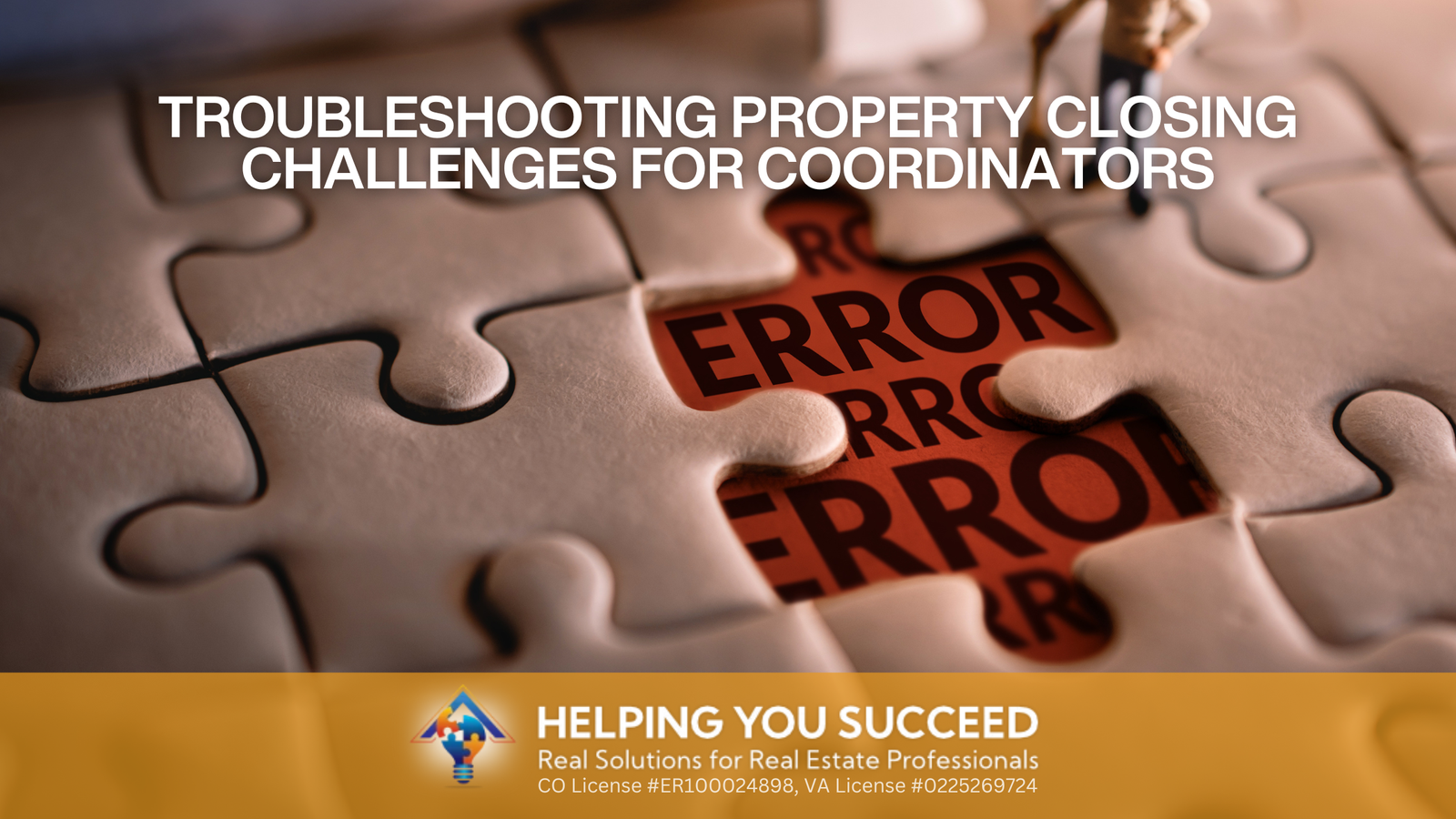When you’re at the closing table of a real estate deal, the tiniest mistake can cause a major delay. That’s why having a property closing coordinator involved is such a smart decision. They focus on making sure every step stays on track from contract to completion. Their job involves more than just checking boxes. It’s about tying everything together and solving problems before they throw the deal off course.
But even experienced coordinators run into roadblocks. Property closing comes with a range of possible setbacks, and some of them can come out of nowhere. Whether it’s a missing document, poor communication between parties, or a deadline that gets pushed at the last minute, these issues often pop up with little warning. That’s why it helps to know what to expect and how to troubleshoot challenges before they turn into full-blown crises.
Identifying Common Property Closing Challenges
Real estate closings can feel like a game of dominos. If one piece slips, the rest might fall with it. Coordinators often face the same types of problems during closings, and while they’re common, they’re still tricky enough to throw off even the most prepared teams.
Here are some typical closing issues:
– Document discrepancies like incorrect dates, misspelled names, or mismatched contract terms can trigger delays and require updated paperwork from multiple parties.
– Missing signatures often hold up the process. A surprising number of deals get stuck waiting for a last-minute signature, either from a buyer, seller, or agent.
– Timeline slippage is a frequent issue. When inspections, loan approvals, or title searches take longer than expected, it can push closing dates past agreed deadlines.
– Poor coordination among parties creates extra confusion. Buyers, sellers, lenders, agents, and lawyers all have different roles. If one party isn’t looped in, it’s easy for information to get lost.
– Last-minute changes like sudden fee adjustments or contract amendments add pressure and confusion to the closing.
A property closing coordinator helps soften the impact of these kinds of problems by working to spot them early. For example, something as simple as using two different spellings of a client’s last name across the documents can cause a title company to pause everything. A coordinator who double-checks against the legal ID early in the process will save everyone time down the road.
Recognizing these challenges is just the first step. The real value shows when coordinators take action before things get off track.
Effective Communication Strategies
One of the fastest ways a closing can fall apart is through unclear or inconsistent communication. When a lender emails one thing, an agent gives an update in a phone call, and the buyer hears something different entirely, it’s no wonder people get confused. That’s where good coordinators stand out. They know how to keep communication simple, timely, and directed to the right people.
Good communication tips for property closing coordinators include:
– Confirm instructions in writing. Always follow up calls or texts with a short email that sums everything up.
– Loop in all relevant parties. Don’t assume someone else already updated the buyer or lender. If it affects the file, share it.
– Create a communication hub. Whether it’s a shared folder, project management system, or email thread, use one consistent place to store updates.
– Use simple, direct language. Avoid long back-and-forth by getting to the point quickly.
– Set expectations early. Let clients and agents know when updates will come and what documents or steps are needed ahead of time.
When everyone is on the same page, small problems usually stay small. Miscommunication turns into missed closings. A coordinator’s role isn’t just about checking items off a list. It’s about making sure everyone knows what’s next and when it needs to happen. That’s how real problems get kept in check.
Implementing Organizational Tools and Techniques
Staying organized is one of the best ways a property closing coordinator can prevent chaos during the closing process. With various documents to track and strict deadlines to meet, using effective tools and methods is key. Coordinators can access a wide range of digital tools designed to make managing real estate closings smoother.
Successful coordinators often rely on:
– Document Management Systems that allow for easy storage and retrieval of important files and help avoid endless email chains.
– Task Management Software such as Trello or Asana to assign tasks, set timelines, and track progress among team members.
– Calendar Applications like Google Calendar to stay on top of deadlines and set helpful reminders.
– Digital Signing Platforms that make it faster and easier for clients and agents to sign documents without needing printouts or in-person meetings.
Organizational tools not only help coordinators keep paperwork and deadlines straight, they bring peace of mind to clients and colleagues alike. With the right setup, coordinators keep everyone connected and make sure no part of the closing slips through the cracks. Structure turns stressful closings into manageable, streamlined processes.
Proactive Problem-Solving Methods
Anticipation is a powerful skill in real estate. Coordinators who can spot trouble before it starts are better equipped to stop issues in their tracks. That kind of forward-thinking keeps stress low and timelines intact.
Some proactive strategies used by experienced coordinators include:
– Regular reviews of agreements and submitted documents to find any mistakes early.
– Scenario planning that considers multiple possible delays or document issues, so backup plans are ready.
– Consistent contact and updates with buyers, sellers, agents, and lenders to clear up any confusion before it creates problems.
– Feedback sessions after closing to understand what worked, what didn’t, and how to improve future transactions.
For example, let’s say a coordinator handled a deal last month that hit a snag because a lien release wasn’t finalized in time. If they know that risk in advance on the next deal, they can check for lien releases earlier and make sure it doesn’t delay another file. It’s this kind of practical, preventative thinking that helps coordinators stay ahead of stress points and keep things moving.
The Difference a Good Coordinator Can Make
The final stretch of a real estate transaction is where all that behind-the-scenes work comes together. Property closing coordinators are the steady hands guiding the process. From preparing documents and confirming signatures to managing communication and addressing last-minute changes, they are right in the middle of what makes a closing successful.
Understanding the common challenges is the first part. Taking action early is what truly sets a strong coordinator apart. Whether it’s with better communication, smarter tools, or proactive thinking, having someone focused on keeping it all together can prevent many headaches.
A good property closing coordinator makes the final mile easier for clients, agents, and every party involved. It’s not just about finishing the job. It’s about making sure the job gets done right.
Whether you’re dealing with complexities in documentation or enhancing communication, having a professional at your side makes all the difference. If you’re ready to streamline your next real estate deal, working with a knowledgeable property closing coordinator can make that happen smoothly and stress-free. With the expertise of Helping You Succeed, ensure a seamless transaction that leaves no room for error.




